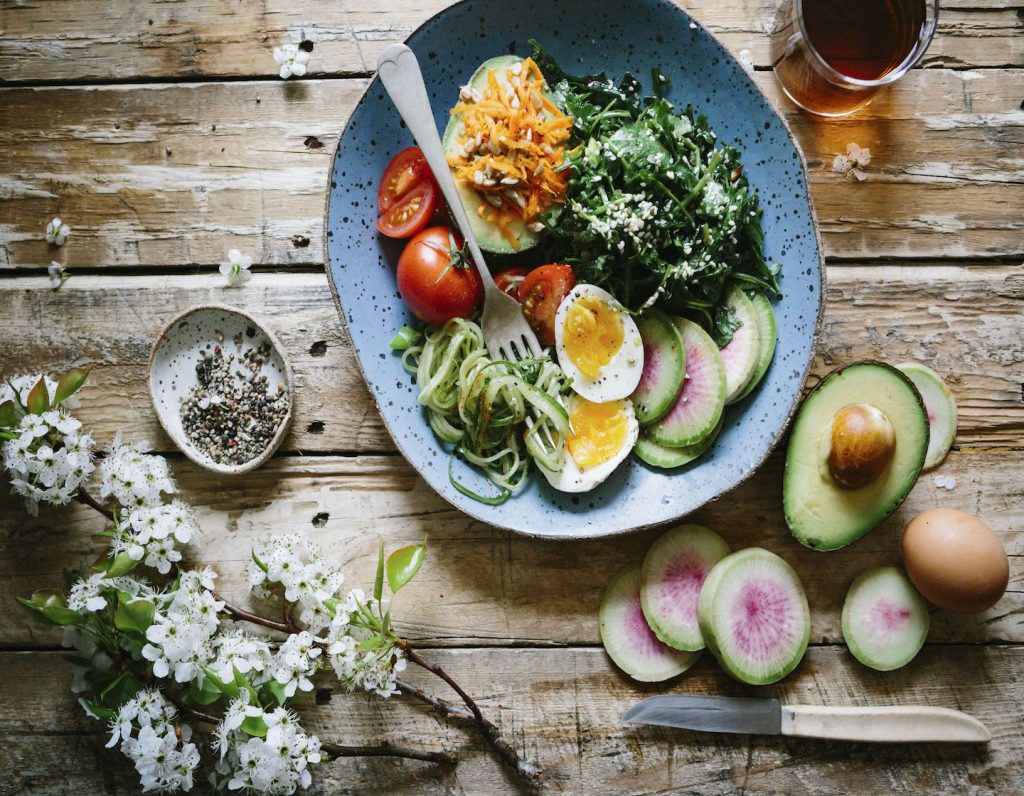
Probiotic and prebiotics to the rescue…!
Pregnancy is such a magical time minus the morning sickness, the bloating, belching, the incessant nightly peeing and for goodness sake… why didn’t anyone warn us about the haemorrhoids? Never is there a time when digestive health takes a bigger beating. That’s why probiotic and prebiotics foods can be a powerful ally in keeping your gut strong and healthy during pregnancy. And a healthy mama-gut equals a healthy baby-gut because our baby inherits our gut flora when it passes through the birth canal.
Boost your probiotic intake with fermented foods
Kimchi, sauerkraut, coconut yoghurt, kefir and miso products are some examples of safe, fermented foods which can help keep your gut healthy and happy during pregnancy. Fermented foods feed the good bacteria in the gut, creating a bigger army of healthy bacteria over bad, opportunistic bacteria and yeast.
Fermented foods are also loaded with Vitamin K2, which is super important during pregnancy. K2 helps the baby develop proper cranial structures, facial form, teeth, as well as strong bones. Most doctors these days are recommending supplementation of VitD3 due to pregnancy’s increased demands on the body. But Vitamin K2 works synergistically with D3 to help keep calcium in your bones, so that you’re not left depleted after pregnancy.
Start the day with a kefir smoothie or a teaspoon of kimchi to soak up your boiled egg yolk. For snack, how about some coconut yoghurt and for dinner how about a lovely, warm miso soup. It is really easy to find these foods in Hong Kong and personally, I find Foodcraft to be the best for ready-made, high quality, fermented products made the traditional Japanese way without any refined sugar, vinegar or other nasties that compromise the quality of the fermented product.
Replace refined carbohydrates with fresh veggies
Refined sugar and carbohydrates feed opportunistic yeast, like candida, in your gut. Symptoms of candida vary from person to person but typical ones include: strong sugar cravings, increased bloating and gas, yeast infections, difficulty concentrating and skin issues like eczema or psoriasis. A lot of these symptoms are exacerbated by pregnancy anyway, so no need to make it all worse by snacking on pineapple buns. Instead, try some carrot sticks with avo dip. This kind of snack gives your gut plenty of prebiotic fibre to keep the intestinal terrain fertile for good bacteria. Other examples of prebiotic foods include onions, garlic, asparagus and sweet root vegetables like carrots and beets. Cooking degrades the prebiotic fibres so try to incorporate some of these foods raw into your diet by shredding carrots and beets into your salads.
Increase your water and fibre intake every day
If the fear of haemorrhoid pain is gripping your bowels into a state of chronic constipation, a gentle solution is to increase your water and fibre intake. My favourite tool is organic psyllium hulls. Please ask your health practitioner how best to take it in your case, but psyllium is a safe, non-habit forming fibre that gently sloughs away all your gut junk in order to facilitate a pain-free pooping experience. Psyllium absorbs a lot of water, however, so it’s imperative that you drink at least two cups of water right after you take it and plenty of water throughout the day in order to ensure that it doesn’t compact in the gut and worsen constipation.
Take a high-quality probiotic daily
Given that 70% of our immune cells and 90% of our happy hormone serotonin is made in our gut, suddenly it’s crystal clear why having a healthy gut is critical during pregnancy. Serotonin is also the precursor to melatonin, the hormone that regulates our sleep cycle. So improving your gut health also has a direct impact on the quality of your sleep. For these reasons, probiotics can help give you that extra boost to stay on top form.
Bifidobacterium strains work in the large intestines and lactobacillus strains work in the small intestine. Babies born vaginally pick up the mother’s lactobacillus species and further population happens during lactation. Pick a probiotic which includes both types of strains and invest in a high quality probiotic in order to ensure that you get what you pay for. Generally speaking, that means buying probiotics that require refrigeration and state four things on the bottle:
- The genus, species & strain of the bacteria on the label. So, for example: Lactobacillus Rhamnosus GR-1.
- The Colony Forming Units (CFU) per strain. For example, Bifidobacterium Bifidum…..2CFU.
- The statement “Viable through end of shelf” to ensure that you are getting that potency from the first capsule to the last.
- Certification by an independent third party. Probiotics are not regulated and there are lot of duds out there.
Taking care of your digestive health is crucial during the pregnancy and not just because it will keep you strong and happy during your pregnancy, but also because it will benefit your baby during birth. All these tips work synergistically to boost the levels of healthy bacteria in your gut and thereby strengthen your immunity.
![]()
Who knew bacteria could actually be good for you!
 View All
View All


 View All
View All


 View All
View All

 View All
View All

 View All
View All



